Research Project: Social Skills Training for Schizophrenia Patients
VerifiedAdded on 2023/06/10
|12
|3407
|112
Report
AI Summary
This research project examines the effectiveness of social skills training (SST) as a nursing intervention for patients with schizophrenia. The study employs a randomized control trial, comparing SST with usual care, and assesses outcomes related to social competence and functioning. The project includes a comprehensive literature review, a detailed methodology involving specific inclusion/exclusion criteria, and data collection using tools like the Independent Living Skills Survey, the Interaction Rating Scale Advanced, and the Positive and Negative Syndrome Scale. The analysis employs thematic analysis, and the findings indicate that patients in the SST group reported positive changes in social competence and functioning. The project highlights the relevance of SST in addressing both positive and negative symptoms of schizophrenia, and it discusses the implications for nursing practice, underscoring the importance of cognitive and social skills training in improving patient outcomes.
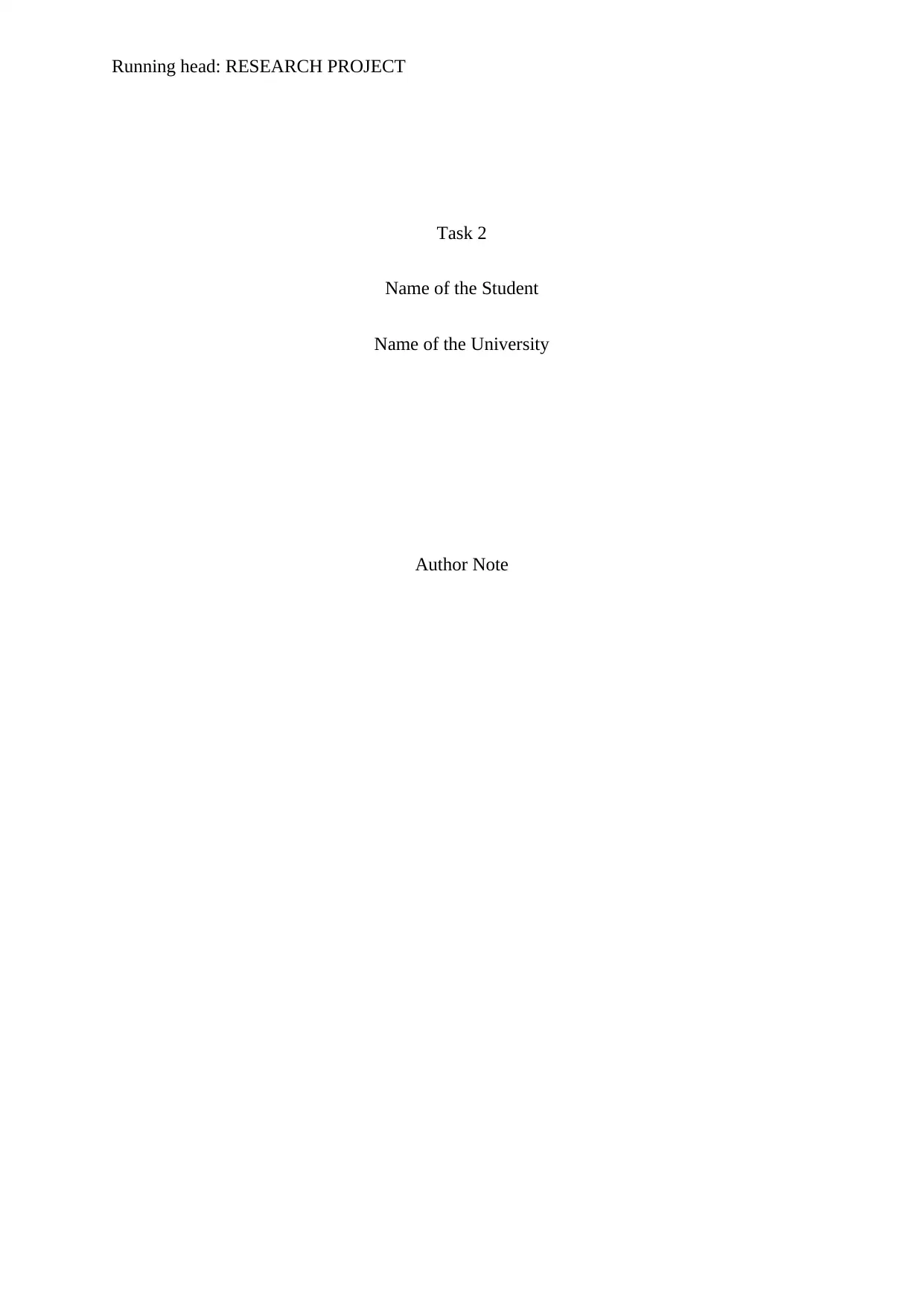
Running head: RESEARCH PROJECT
Task 2
Name of the Student
Name of the University
Author Note
Task 2
Name of the Student
Name of the University
Author Note
Paraphrase This Document
Need a fresh take? Get an instant paraphrase of this document with our AI Paraphraser
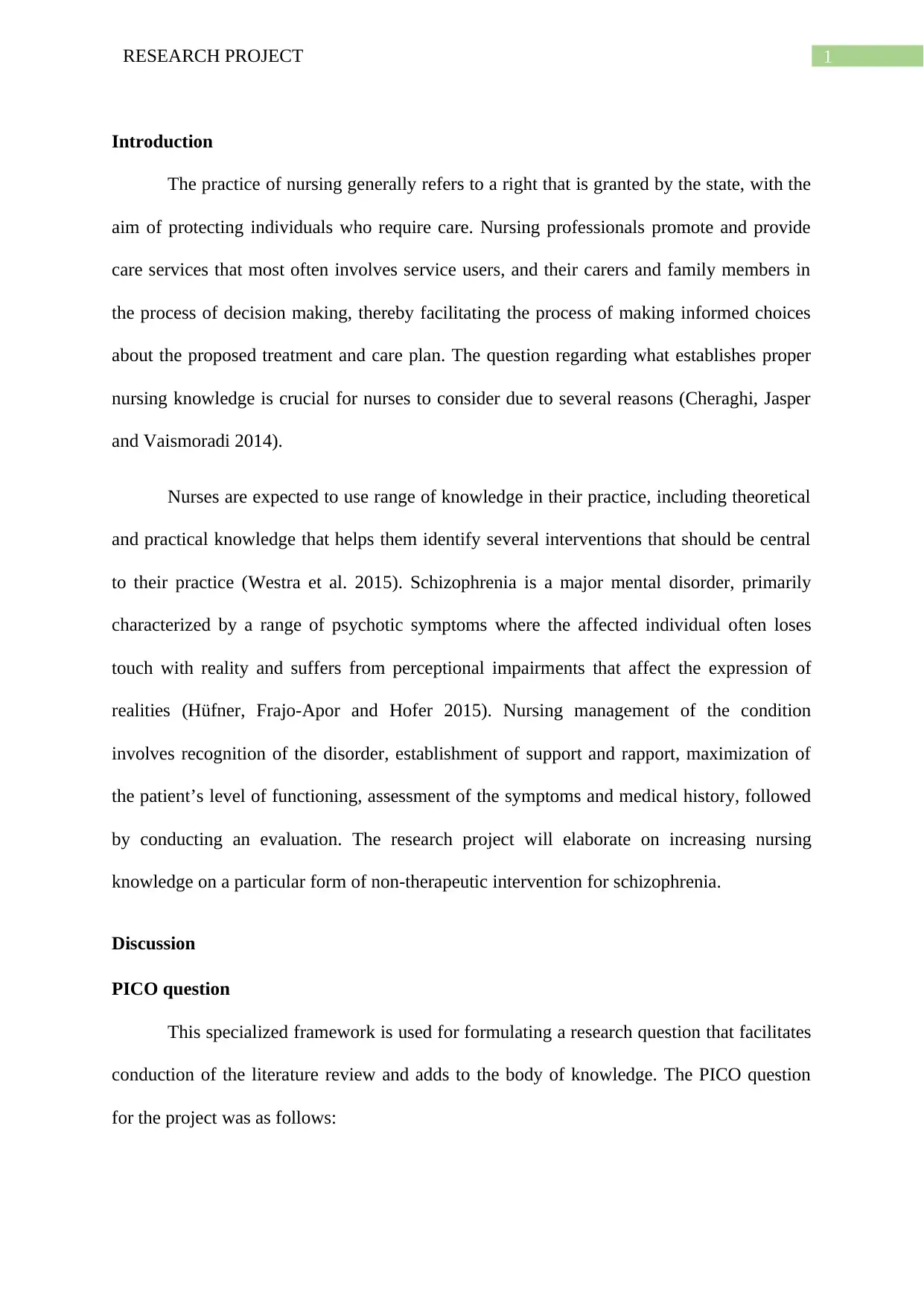
1RESEARCH PROJECT
Introduction
The practice of nursing generally refers to a right that is granted by the state, with the
aim of protecting individuals who require care. Nursing professionals promote and provide
care services that most often involves service users, and their carers and family members in
the process of decision making, thereby facilitating the process of making informed choices
about the proposed treatment and care plan. The question regarding what establishes proper
nursing knowledge is crucial for nurses to consider due to several reasons (Cheraghi, Jasper
and Vaismoradi 2014).
Nurses are expected to use range of knowledge in their practice, including theoretical
and practical knowledge that helps them identify several interventions that should be central
to their practice (Westra et al. 2015). Schizophrenia is a major mental disorder, primarily
characterized by a range of psychotic symptoms where the affected individual often loses
touch with reality and suffers from perceptional impairments that affect the expression of
realities (Hüfner, Frajo-Apor and Hofer 2015). Nursing management of the condition
involves recognition of the disorder, establishment of support and rapport, maximization of
the patient’s level of functioning, assessment of the symptoms and medical history, followed
by conducting an evaluation. The research project will elaborate on increasing nursing
knowledge on a particular form of non-therapeutic intervention for schizophrenia.
Discussion
PICO question
This specialized framework is used for formulating a research question that facilitates
conduction of the literature review and adds to the body of knowledge. The PICO question
for the project was as follows:
Introduction
The practice of nursing generally refers to a right that is granted by the state, with the
aim of protecting individuals who require care. Nursing professionals promote and provide
care services that most often involves service users, and their carers and family members in
the process of decision making, thereby facilitating the process of making informed choices
about the proposed treatment and care plan. The question regarding what establishes proper
nursing knowledge is crucial for nurses to consider due to several reasons (Cheraghi, Jasper
and Vaismoradi 2014).
Nurses are expected to use range of knowledge in their practice, including theoretical
and practical knowledge that helps them identify several interventions that should be central
to their practice (Westra et al. 2015). Schizophrenia is a major mental disorder, primarily
characterized by a range of psychotic symptoms where the affected individual often loses
touch with reality and suffers from perceptional impairments that affect the expression of
realities (Hüfner, Frajo-Apor and Hofer 2015). Nursing management of the condition
involves recognition of the disorder, establishment of support and rapport, maximization of
the patient’s level of functioning, assessment of the symptoms and medical history, followed
by conducting an evaluation. The research project will elaborate on increasing nursing
knowledge on a particular form of non-therapeutic intervention for schizophrenia.
Discussion
PICO question
This specialized framework is used for formulating a research question that facilitates
conduction of the literature review and adds to the body of knowledge. The PICO question
for the project was as follows:

2RESEARCH PROJECT
Do social skills training improve functioning in schizophrenia patients, when
compared to their usual standard treatment?
P (Population/problem) Schizophrenia patients
I (Intervention) Social skills training
C (Comparison) Usual care
O (Outcome) Improved functioning
Table 1: PICO framework
Literature review
Social skills training refers to a kind of psychotherapy approach that works with the
aim of aiding people to advance their social skills and competence. A single-blind
randomized controlled trial was conducted among veteran and non-veteran schizophrenia
consumers in an outpatient clinic and combined social skills training with cognitive
behavioural therapy in the intervention group (CBSST) (Granholm et al. 2013). Following the
36 week session of the therapy, significant positive results were obtained in the functional
trajectories of the patients, over time. The training program was also associated with better
improvements in the pessimistic attitudes of the patients. Similar findings were obtained in
another RCT that randomly assigned patients with schizophrenia and schizoaffective disorder
to a CBSST group and a control group (Granholm et al. 2014). Negative symptoms, defeatist
performance insolences, functionality, and amotivation were found to significantly improve
among the patients in the CBSST group. This indicates that social skills training, in
combination with CBT acted as an effective nursing intervention for improving the reduced
functioning and negative symptoms that are commonly reported by schizophrenia patients.
A preliminary study was also conducted with the aim of improving social competence
and functioning among patients suffering from schizophrenia (Rus-Calafell et al. 2013). 31
Do social skills training improve functioning in schizophrenia patients, when
compared to their usual standard treatment?
P (Population/problem) Schizophrenia patients
I (Intervention) Social skills training
C (Comparison) Usual care
O (Outcome) Improved functioning
Table 1: PICO framework
Literature review
Social skills training refers to a kind of psychotherapy approach that works with the
aim of aiding people to advance their social skills and competence. A single-blind
randomized controlled trial was conducted among veteran and non-veteran schizophrenia
consumers in an outpatient clinic and combined social skills training with cognitive
behavioural therapy in the intervention group (CBSST) (Granholm et al. 2013). Following the
36 week session of the therapy, significant positive results were obtained in the functional
trajectories of the patients, over time. The training program was also associated with better
improvements in the pessimistic attitudes of the patients. Similar findings were obtained in
another RCT that randomly assigned patients with schizophrenia and schizoaffective disorder
to a CBSST group and a control group (Granholm et al. 2014). Negative symptoms, defeatist
performance insolences, functionality, and amotivation were found to significantly improve
among the patients in the CBSST group. This indicates that social skills training, in
combination with CBT acted as an effective nursing intervention for improving the reduced
functioning and negative symptoms that are commonly reported by schizophrenia patients.
A preliminary study was also conducted with the aim of improving social competence
and functioning among patients suffering from schizophrenia (Rus-Calafell et al. 2013). 31
⊘ This is a preview!⊘
Do you want full access?
Subscribe today to unlock all pages.

Trusted by 1+ million students worldwide
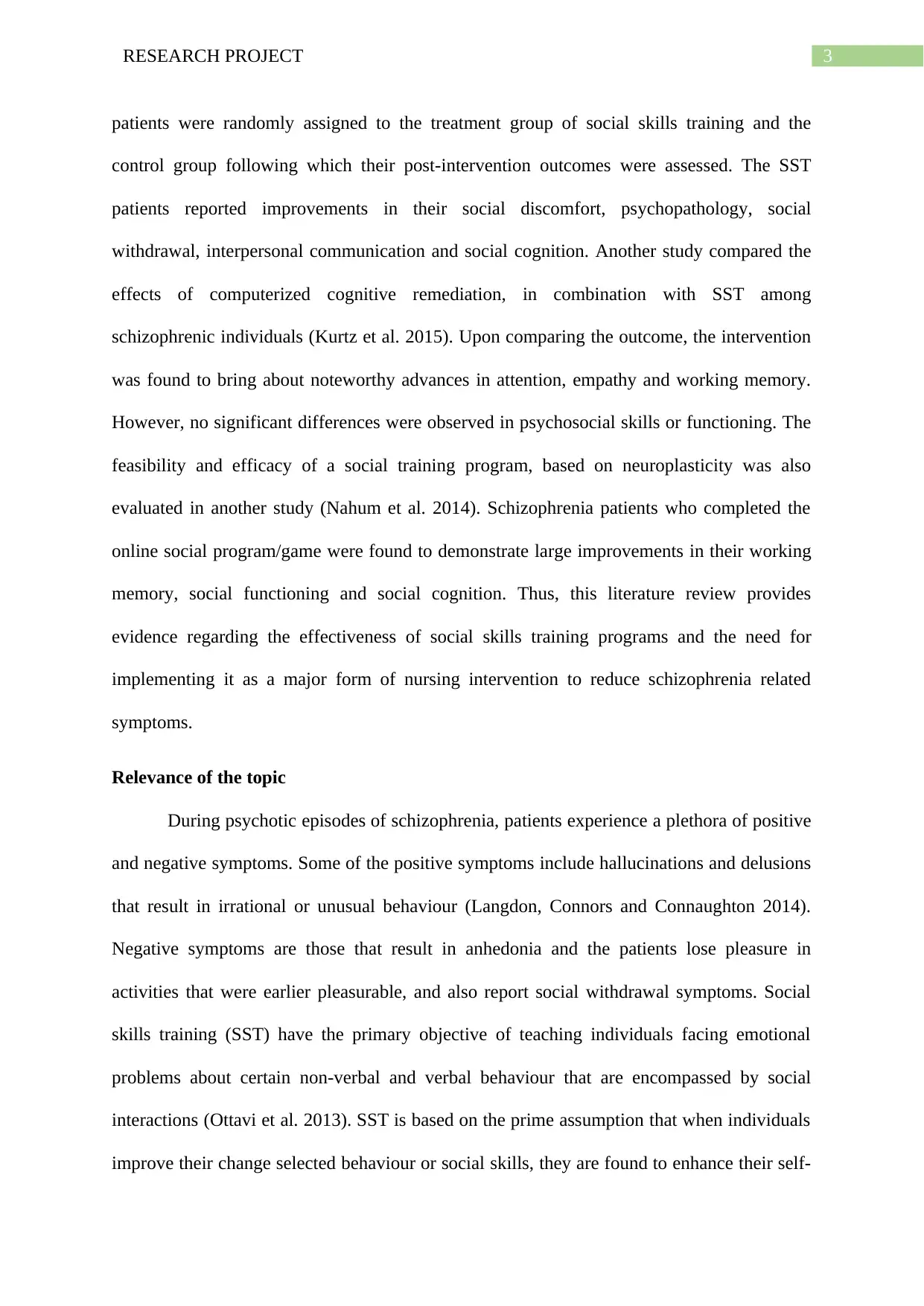
3RESEARCH PROJECT
patients were randomly assigned to the treatment group of social skills training and the
control group following which their post-intervention outcomes were assessed. The SST
patients reported improvements in their social discomfort, psychopathology, social
withdrawal, interpersonal communication and social cognition. Another study compared the
effects of computerized cognitive remediation, in combination with SST among
schizophrenic individuals (Kurtz et al. 2015). Upon comparing the outcome, the intervention
was found to bring about noteworthy advances in attention, empathy and working memory.
However, no significant differences were observed in psychosocial skills or functioning. The
feasibility and efficacy of a social training program, based on neuroplasticity was also
evaluated in another study (Nahum et al. 2014). Schizophrenia patients who completed the
online social program/game were found to demonstrate large improvements in their working
memory, social functioning and social cognition. Thus, this literature review provides
evidence regarding the effectiveness of social skills training programs and the need for
implementing it as a major form of nursing intervention to reduce schizophrenia related
symptoms.
Relevance of the topic
During psychotic episodes of schizophrenia, patients experience a plethora of positive
and negative symptoms. Some of the positive symptoms include hallucinations and delusions
that result in irrational or unusual behaviour (Langdon, Connors and Connaughton 2014).
Negative symptoms are those that result in anhedonia and the patients lose pleasure in
activities that were earlier pleasurable, and also report social withdrawal symptoms. Social
skills training (SST) have the primary objective of teaching individuals facing emotional
problems about certain non-verbal and verbal behaviour that are encompassed by social
interactions (Ottavi et al. 2013). SST is based on the prime assumption that when individuals
improve their change selected behaviour or social skills, they are found to enhance their self-
patients were randomly assigned to the treatment group of social skills training and the
control group following which their post-intervention outcomes were assessed. The SST
patients reported improvements in their social discomfort, psychopathology, social
withdrawal, interpersonal communication and social cognition. Another study compared the
effects of computerized cognitive remediation, in combination with SST among
schizophrenic individuals (Kurtz et al. 2015). Upon comparing the outcome, the intervention
was found to bring about noteworthy advances in attention, empathy and working memory.
However, no significant differences were observed in psychosocial skills or functioning. The
feasibility and efficacy of a social training program, based on neuroplasticity was also
evaluated in another study (Nahum et al. 2014). Schizophrenia patients who completed the
online social program/game were found to demonstrate large improvements in their working
memory, social functioning and social cognition. Thus, this literature review provides
evidence regarding the effectiveness of social skills training programs and the need for
implementing it as a major form of nursing intervention to reduce schizophrenia related
symptoms.
Relevance of the topic
During psychotic episodes of schizophrenia, patients experience a plethora of positive
and negative symptoms. Some of the positive symptoms include hallucinations and delusions
that result in irrational or unusual behaviour (Langdon, Connors and Connaughton 2014).
Negative symptoms are those that result in anhedonia and the patients lose pleasure in
activities that were earlier pleasurable, and also report social withdrawal symptoms. Social
skills training (SST) have the primary objective of teaching individuals facing emotional
problems about certain non-verbal and verbal behaviour that are encompassed by social
interactions (Ottavi et al. 2013). SST is based on the prime assumption that when individuals
improve their change selected behaviour or social skills, they are found to enhance their self-
Paraphrase This Document
Need a fresh take? Get an instant paraphrase of this document with our AI Paraphraser
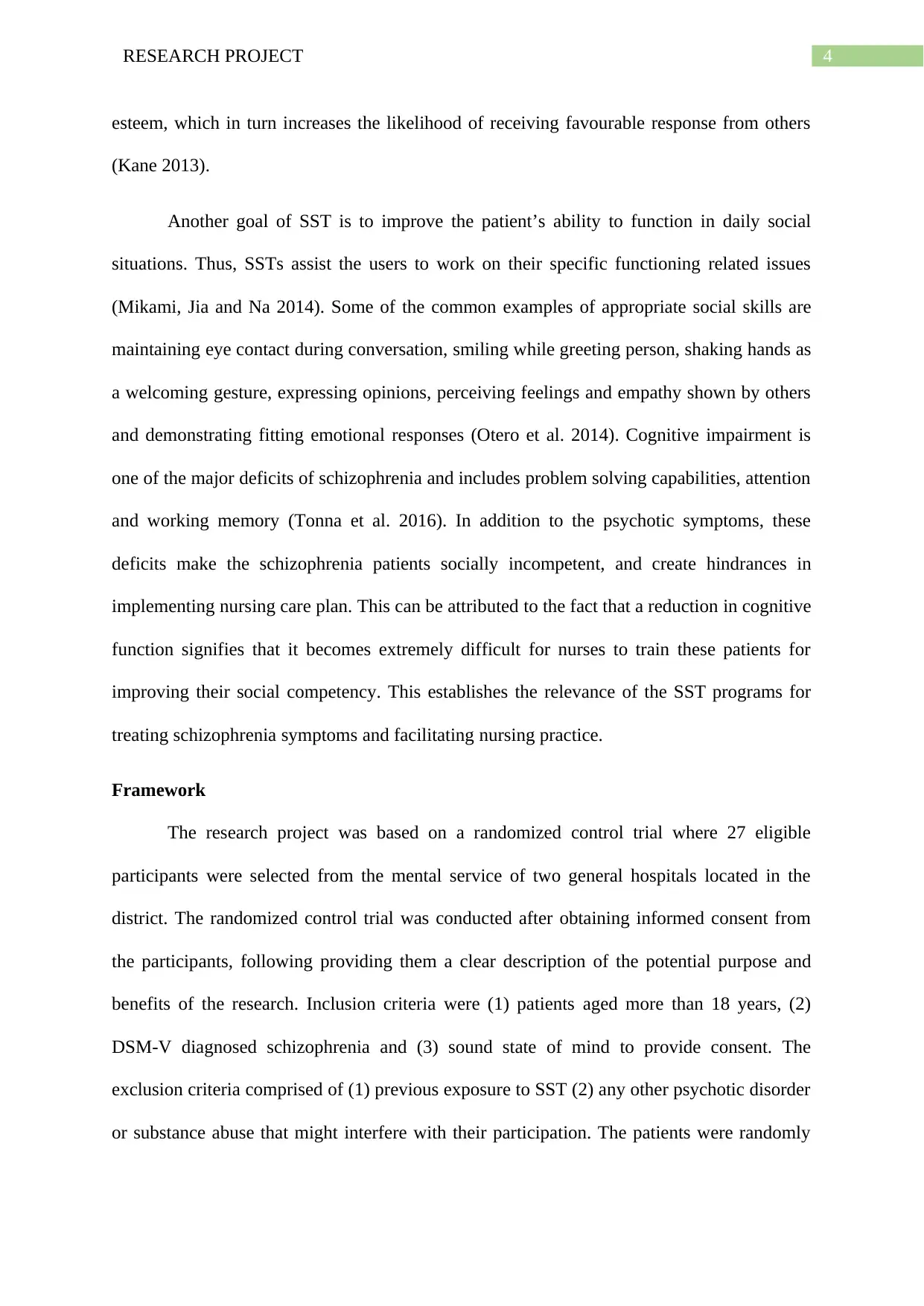
4RESEARCH PROJECT
esteem, which in turn increases the likelihood of receiving favourable response from others
(Kane 2013).
Another goal of SST is to improve the patient’s ability to function in daily social
situations. Thus, SSTs assist the users to work on their specific functioning related issues
(Mikami, Jia and Na 2014). Some of the common examples of appropriate social skills are
maintaining eye contact during conversation, smiling while greeting person, shaking hands as
a welcoming gesture, expressing opinions, perceiving feelings and empathy shown by others
and demonstrating fitting emotional responses (Otero et al. 2014). Cognitive impairment is
one of the major deficits of schizophrenia and includes problem solving capabilities, attention
and working memory (Tonna et al. 2016). In addition to the psychotic symptoms, these
deficits make the schizophrenia patients socially incompetent, and create hindrances in
implementing nursing care plan. This can be attributed to the fact that a reduction in cognitive
function signifies that it becomes extremely difficult for nurses to train these patients for
improving their social competency. This establishes the relevance of the SST programs for
treating schizophrenia symptoms and facilitating nursing practice.
Framework
The research project was based on a randomized control trial where 27 eligible
participants were selected from the mental service of two general hospitals located in the
district. The randomized control trial was conducted after obtaining informed consent from
the participants, following providing them a clear description of the potential purpose and
benefits of the research. Inclusion criteria were (1) patients aged more than 18 years, (2)
DSM-V diagnosed schizophrenia and (3) sound state of mind to provide consent. The
exclusion criteria comprised of (1) previous exposure to SST (2) any other psychotic disorder
or substance abuse that might interfere with their participation. The patients were randomly
esteem, which in turn increases the likelihood of receiving favourable response from others
(Kane 2013).
Another goal of SST is to improve the patient’s ability to function in daily social
situations. Thus, SSTs assist the users to work on their specific functioning related issues
(Mikami, Jia and Na 2014). Some of the common examples of appropriate social skills are
maintaining eye contact during conversation, smiling while greeting person, shaking hands as
a welcoming gesture, expressing opinions, perceiving feelings and empathy shown by others
and demonstrating fitting emotional responses (Otero et al. 2014). Cognitive impairment is
one of the major deficits of schizophrenia and includes problem solving capabilities, attention
and working memory (Tonna et al. 2016). In addition to the psychotic symptoms, these
deficits make the schizophrenia patients socially incompetent, and create hindrances in
implementing nursing care plan. This can be attributed to the fact that a reduction in cognitive
function signifies that it becomes extremely difficult for nurses to train these patients for
improving their social competency. This establishes the relevance of the SST programs for
treating schizophrenia symptoms and facilitating nursing practice.
Framework
The research project was based on a randomized control trial where 27 eligible
participants were selected from the mental service of two general hospitals located in the
district. The randomized control trial was conducted after obtaining informed consent from
the participants, following providing them a clear description of the potential purpose and
benefits of the research. Inclusion criteria were (1) patients aged more than 18 years, (2)
DSM-V diagnosed schizophrenia and (3) sound state of mind to provide consent. The
exclusion criteria comprised of (1) previous exposure to SST (2) any other psychotic disorder
or substance abuse that might interfere with their participation. The patients were randomly
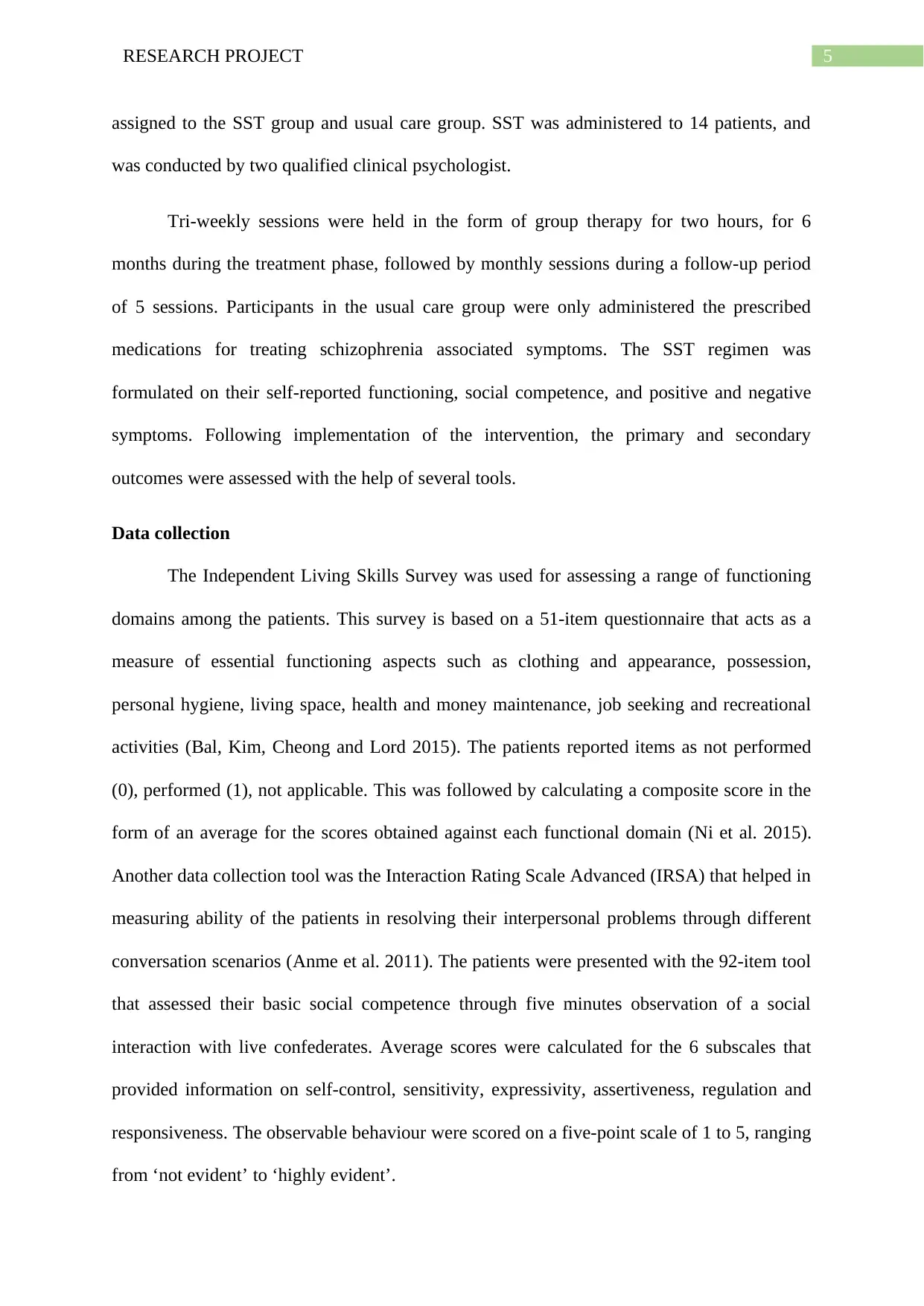
5RESEARCH PROJECT
assigned to the SST group and usual care group. SST was administered to 14 patients, and
was conducted by two qualified clinical psychologist.
Tri-weekly sessions were held in the form of group therapy for two hours, for 6
months during the treatment phase, followed by monthly sessions during a follow-up period
of 5 sessions. Participants in the usual care group were only administered the prescribed
medications for treating schizophrenia associated symptoms. The SST regimen was
formulated on their self-reported functioning, social competence, and positive and negative
symptoms. Following implementation of the intervention, the primary and secondary
outcomes were assessed with the help of several tools.
Data collection
The Independent Living Skills Survey was used for assessing a range of functioning
domains among the patients. This survey is based on a 51-item questionnaire that acts as a
measure of essential functioning aspects such as clothing and appearance, possession,
personal hygiene, living space, health and money maintenance, job seeking and recreational
activities (Bal, Kim, Cheong and Lord 2015). The patients reported items as not performed
(0), performed (1), not applicable. This was followed by calculating a composite score in the
form of an average for the scores obtained against each functional domain (Ni et al. 2015).
Another data collection tool was the Interaction Rating Scale Advanced (IRSA) that helped in
measuring ability of the patients in resolving their interpersonal problems through different
conversation scenarios (Anme et al. 2011). The patients were presented with the 92-item tool
that assessed their basic social competence through five minutes observation of a social
interaction with live confederates. Average scores were calculated for the 6 subscales that
provided information on self-control, sensitivity, expressivity, assertiveness, regulation and
responsiveness. The observable behaviour were scored on a five-point scale of 1 to 5, ranging
from ‘not evident’ to ‘highly evident’.
assigned to the SST group and usual care group. SST was administered to 14 patients, and
was conducted by two qualified clinical psychologist.
Tri-weekly sessions were held in the form of group therapy for two hours, for 6
months during the treatment phase, followed by monthly sessions during a follow-up period
of 5 sessions. Participants in the usual care group were only administered the prescribed
medications for treating schizophrenia associated symptoms. The SST regimen was
formulated on their self-reported functioning, social competence, and positive and negative
symptoms. Following implementation of the intervention, the primary and secondary
outcomes were assessed with the help of several tools.
Data collection
The Independent Living Skills Survey was used for assessing a range of functioning
domains among the patients. This survey is based on a 51-item questionnaire that acts as a
measure of essential functioning aspects such as clothing and appearance, possession,
personal hygiene, living space, health and money maintenance, job seeking and recreational
activities (Bal, Kim, Cheong and Lord 2015). The patients reported items as not performed
(0), performed (1), not applicable. This was followed by calculating a composite score in the
form of an average for the scores obtained against each functional domain (Ni et al. 2015).
Another data collection tool was the Interaction Rating Scale Advanced (IRSA) that helped in
measuring ability of the patients in resolving their interpersonal problems through different
conversation scenarios (Anme et al. 2011). The patients were presented with the 92-item tool
that assessed their basic social competence through five minutes observation of a social
interaction with live confederates. Average scores were calculated for the 6 subscales that
provided information on self-control, sensitivity, expressivity, assertiveness, regulation and
responsiveness. The observable behaviour were scored on a five-point scale of 1 to 5, ranging
from ‘not evident’ to ‘highly evident’.
⊘ This is a preview!⊘
Do you want full access?
Subscribe today to unlock all pages.

Trusted by 1+ million students worldwide
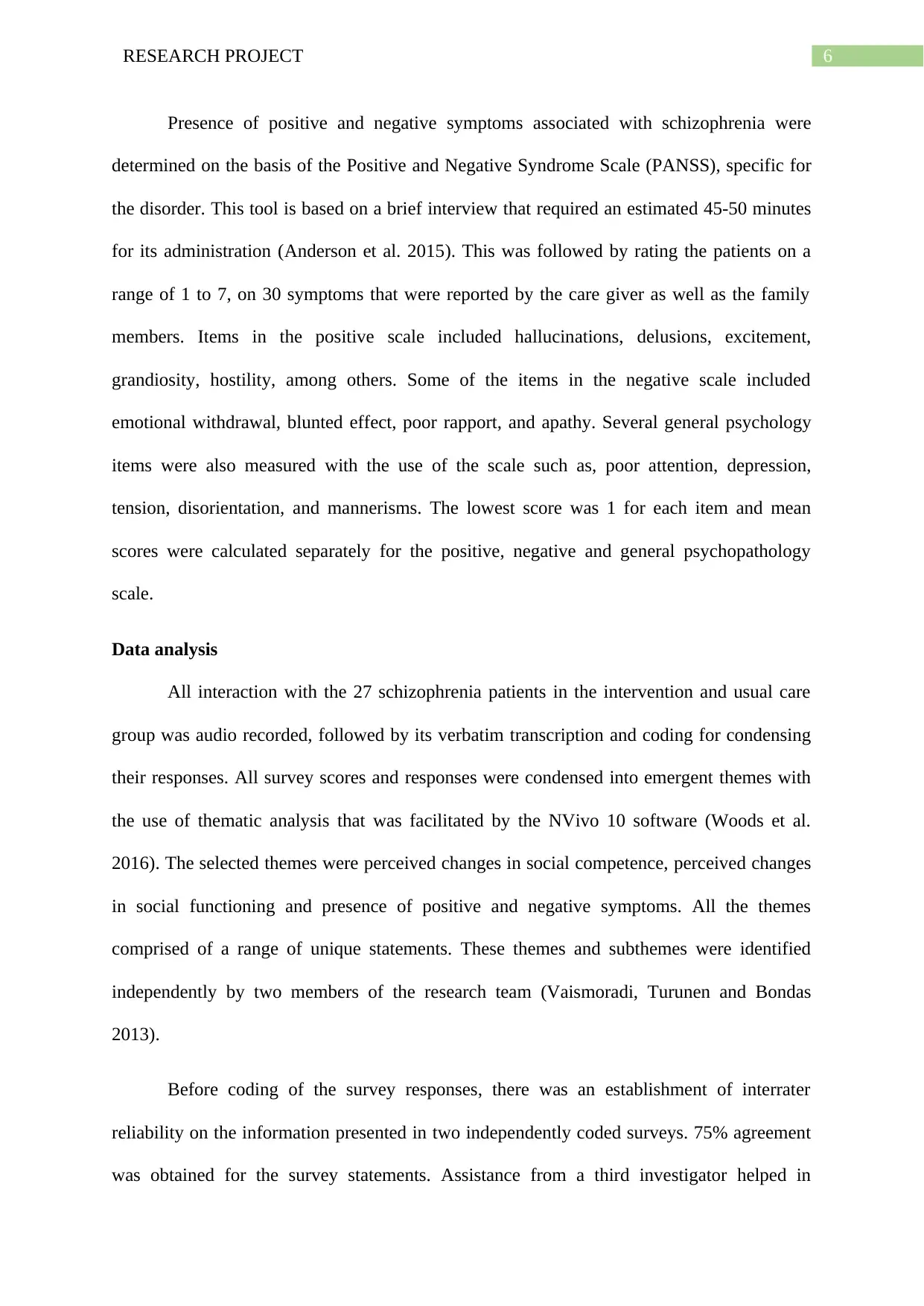
6RESEARCH PROJECT
Presence of positive and negative symptoms associated with schizophrenia were
determined on the basis of the Positive and Negative Syndrome Scale (PANSS), specific for
the disorder. This tool is based on a brief interview that required an estimated 45-50 minutes
for its administration (Anderson et al. 2015). This was followed by rating the patients on a
range of 1 to 7, on 30 symptoms that were reported by the care giver as well as the family
members. Items in the positive scale included hallucinations, delusions, excitement,
grandiosity, hostility, among others. Some of the items in the negative scale included
emotional withdrawal, blunted effect, poor rapport, and apathy. Several general psychology
items were also measured with the use of the scale such as, poor attention, depression,
tension, disorientation, and mannerisms. The lowest score was 1 for each item and mean
scores were calculated separately for the positive, negative and general psychopathology
scale.
Data analysis
All interaction with the 27 schizophrenia patients in the intervention and usual care
group was audio recorded, followed by its verbatim transcription and coding for condensing
their responses. All survey scores and responses were condensed into emergent themes with
the use of thematic analysis that was facilitated by the NVivo 10 software (Woods et al.
2016). The selected themes were perceived changes in social competence, perceived changes
in social functioning and presence of positive and negative symptoms. All the themes
comprised of a range of unique statements. These themes and subthemes were identified
independently by two members of the research team (Vaismoradi, Turunen and Bondas
2013).
Before coding of the survey responses, there was an establishment of interrater
reliability on the information presented in two independently coded surveys. 75% agreement
was obtained for the survey statements. Assistance from a third investigator helped in
Presence of positive and negative symptoms associated with schizophrenia were
determined on the basis of the Positive and Negative Syndrome Scale (PANSS), specific for
the disorder. This tool is based on a brief interview that required an estimated 45-50 minutes
for its administration (Anderson et al. 2015). This was followed by rating the patients on a
range of 1 to 7, on 30 symptoms that were reported by the care giver as well as the family
members. Items in the positive scale included hallucinations, delusions, excitement,
grandiosity, hostility, among others. Some of the items in the negative scale included
emotional withdrawal, blunted effect, poor rapport, and apathy. Several general psychology
items were also measured with the use of the scale such as, poor attention, depression,
tension, disorientation, and mannerisms. The lowest score was 1 for each item and mean
scores were calculated separately for the positive, negative and general psychopathology
scale.
Data analysis
All interaction with the 27 schizophrenia patients in the intervention and usual care
group was audio recorded, followed by its verbatim transcription and coding for condensing
their responses. All survey scores and responses were condensed into emergent themes with
the use of thematic analysis that was facilitated by the NVivo 10 software (Woods et al.
2016). The selected themes were perceived changes in social competence, perceived changes
in social functioning and presence of positive and negative symptoms. All the themes
comprised of a range of unique statements. These themes and subthemes were identified
independently by two members of the research team (Vaismoradi, Turunen and Bondas
2013).
Before coding of the survey responses, there was an establishment of interrater
reliability on the information presented in two independently coded surveys. 75% agreement
was obtained for the survey statements. Assistance from a third investigator helped in
Paraphrase This Document
Need a fresh take? Get an instant paraphrase of this document with our AI Paraphraser
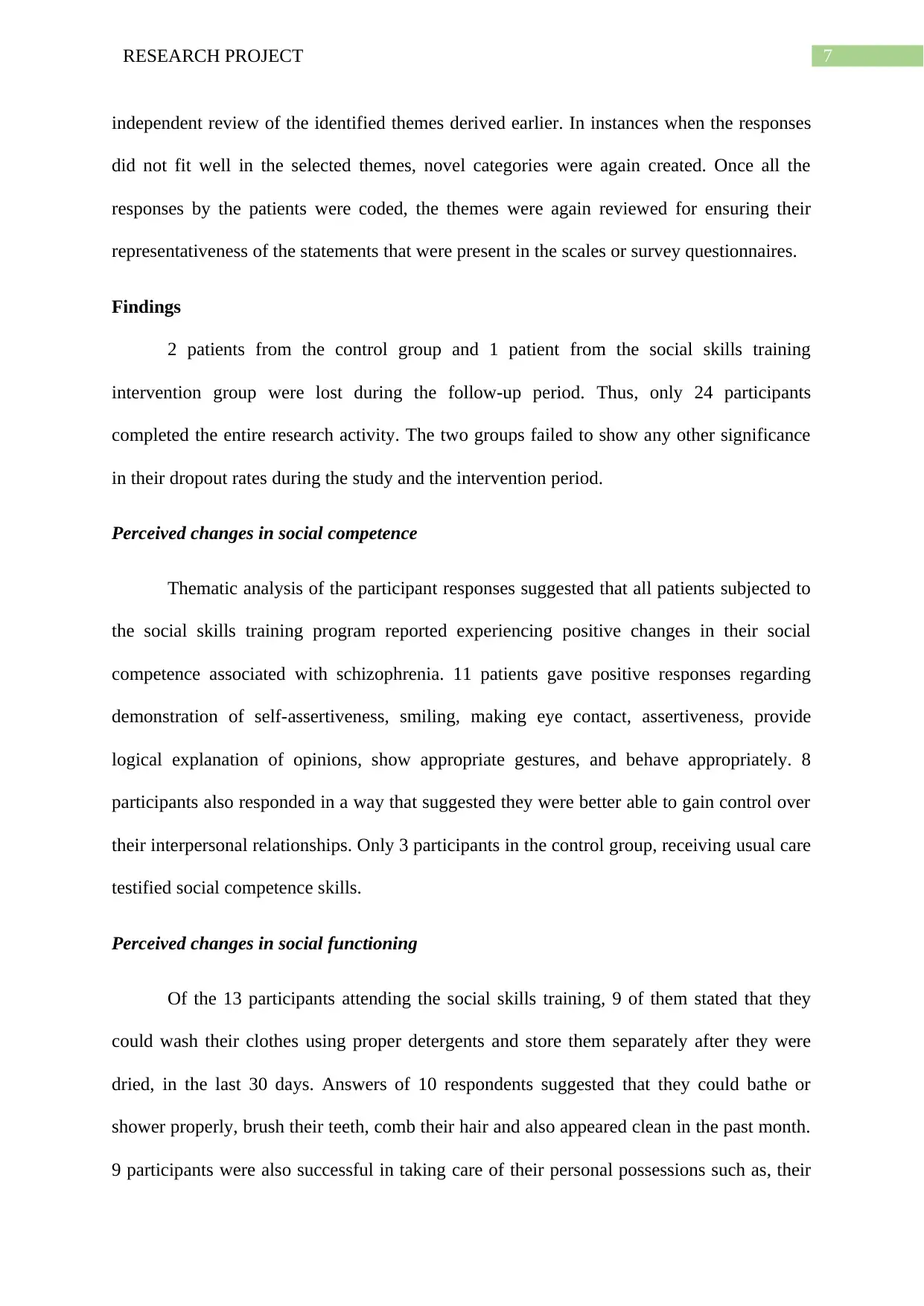
7RESEARCH PROJECT
independent review of the identified themes derived earlier. In instances when the responses
did not fit well in the selected themes, novel categories were again created. Once all the
responses by the patients were coded, the themes were again reviewed for ensuring their
representativeness of the statements that were present in the scales or survey questionnaires.
Findings
2 patients from the control group and 1 patient from the social skills training
intervention group were lost during the follow-up period. Thus, only 24 participants
completed the entire research activity. The two groups failed to show any other significance
in their dropout rates during the study and the intervention period.
Perceived changes in social competence
Thematic analysis of the participant responses suggested that all patients subjected to
the social skills training program reported experiencing positive changes in their social
competence associated with schizophrenia. 11 patients gave positive responses regarding
demonstration of self-assertiveness, smiling, making eye contact, assertiveness, provide
logical explanation of opinions, show appropriate gestures, and behave appropriately. 8
participants also responded in a way that suggested they were better able to gain control over
their interpersonal relationships. Only 3 participants in the control group, receiving usual care
testified social competence skills.
Perceived changes in social functioning
Of the 13 participants attending the social skills training, 9 of them stated that they
could wash their clothes using proper detergents and store them separately after they were
dried, in the last 30 days. Answers of 10 respondents suggested that they could bathe or
shower properly, brush their teeth, comb their hair and also appeared clean in the past month.
9 participants were also successful in taking care of their personal possessions such as, their
independent review of the identified themes derived earlier. In instances when the responses
did not fit well in the selected themes, novel categories were again created. Once all the
responses by the patients were coded, the themes were again reviewed for ensuring their
representativeness of the statements that were present in the scales or survey questionnaires.
Findings
2 patients from the control group and 1 patient from the social skills training
intervention group were lost during the follow-up period. Thus, only 24 participants
completed the entire research activity. The two groups failed to show any other significance
in their dropout rates during the study and the intervention period.
Perceived changes in social competence
Thematic analysis of the participant responses suggested that all patients subjected to
the social skills training program reported experiencing positive changes in their social
competence associated with schizophrenia. 11 patients gave positive responses regarding
demonstration of self-assertiveness, smiling, making eye contact, assertiveness, provide
logical explanation of opinions, show appropriate gestures, and behave appropriately. 8
participants also responded in a way that suggested they were better able to gain control over
their interpersonal relationships. Only 3 participants in the control group, receiving usual care
testified social competence skills.
Perceived changes in social functioning
Of the 13 participants attending the social skills training, 9 of them stated that they
could wash their clothes using proper detergents and store them separately after they were
dried, in the last 30 days. Answers of 10 respondents suggested that they could bathe or
shower properly, brush their teeth, comb their hair and also appeared clean in the past month.
9 participants were also successful in taking care of their personal possessions such as, their
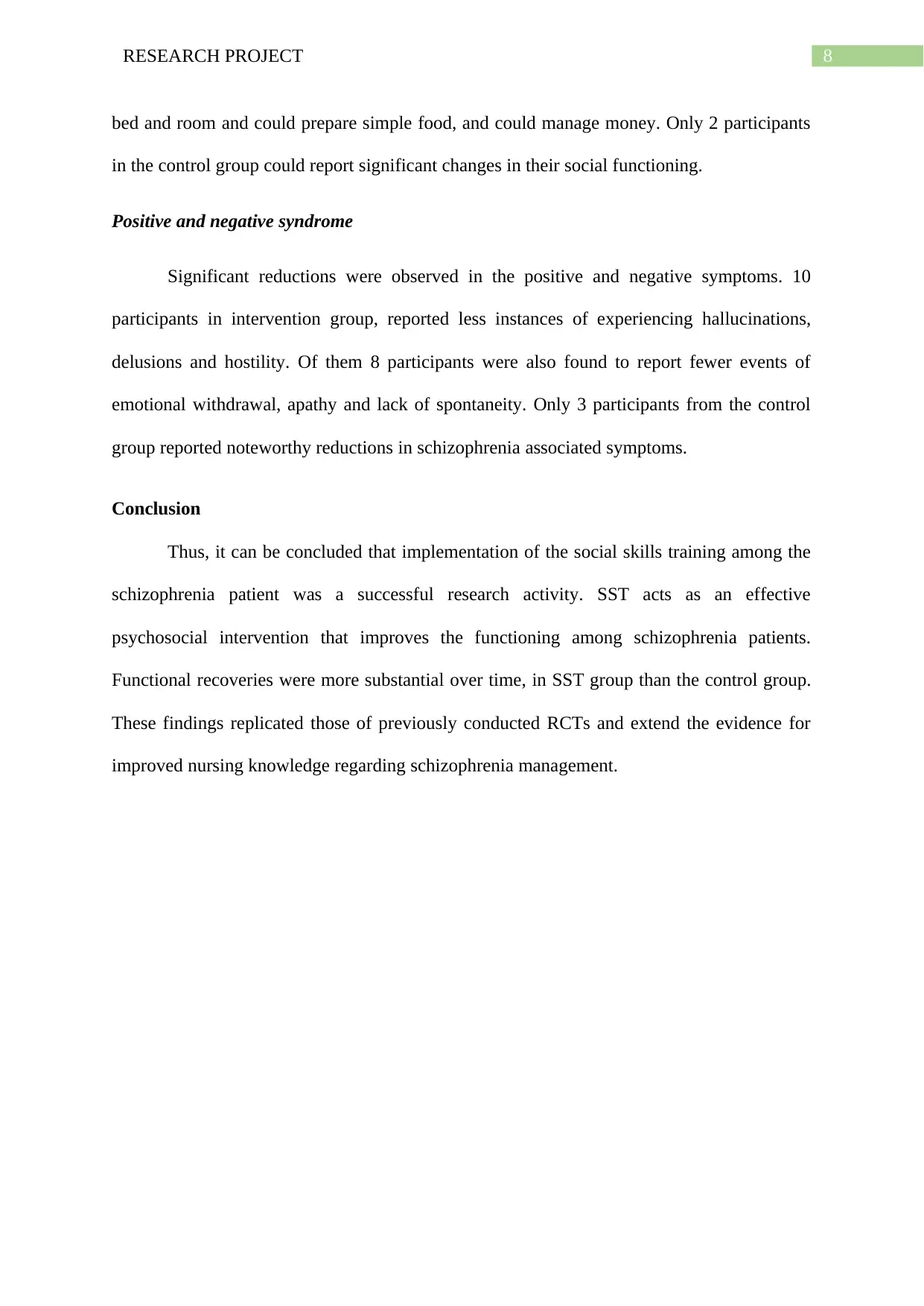
8RESEARCH PROJECT
bed and room and could prepare simple food, and could manage money. Only 2 participants
in the control group could report significant changes in their social functioning.
Positive and negative syndrome
Significant reductions were observed in the positive and negative symptoms. 10
participants in intervention group, reported less instances of experiencing hallucinations,
delusions and hostility. Of them 8 participants were also found to report fewer events of
emotional withdrawal, apathy and lack of spontaneity. Only 3 participants from the control
group reported noteworthy reductions in schizophrenia associated symptoms.
Conclusion
Thus, it can be concluded that implementation of the social skills training among the
schizophrenia patient was a successful research activity. SST acts as an effective
psychosocial intervention that improves the functioning among schizophrenia patients.
Functional recoveries were more substantial over time, in SST group than the control group.
These findings replicated those of previously conducted RCTs and extend the evidence for
improved nursing knowledge regarding schizophrenia management.
bed and room and could prepare simple food, and could manage money. Only 2 participants
in the control group could report significant changes in their social functioning.
Positive and negative syndrome
Significant reductions were observed in the positive and negative symptoms. 10
participants in intervention group, reported less instances of experiencing hallucinations,
delusions and hostility. Of them 8 participants were also found to report fewer events of
emotional withdrawal, apathy and lack of spontaneity. Only 3 participants from the control
group reported noteworthy reductions in schizophrenia associated symptoms.
Conclusion
Thus, it can be concluded that implementation of the social skills training among the
schizophrenia patient was a successful research activity. SST acts as an effective
psychosocial intervention that improves the functioning among schizophrenia patients.
Functional recoveries were more substantial over time, in SST group than the control group.
These findings replicated those of previously conducted RCTs and extend the evidence for
improved nursing knowledge regarding schizophrenia management.
⊘ This is a preview!⊘
Do you want full access?
Subscribe today to unlock all pages.

Trusted by 1+ million students worldwide
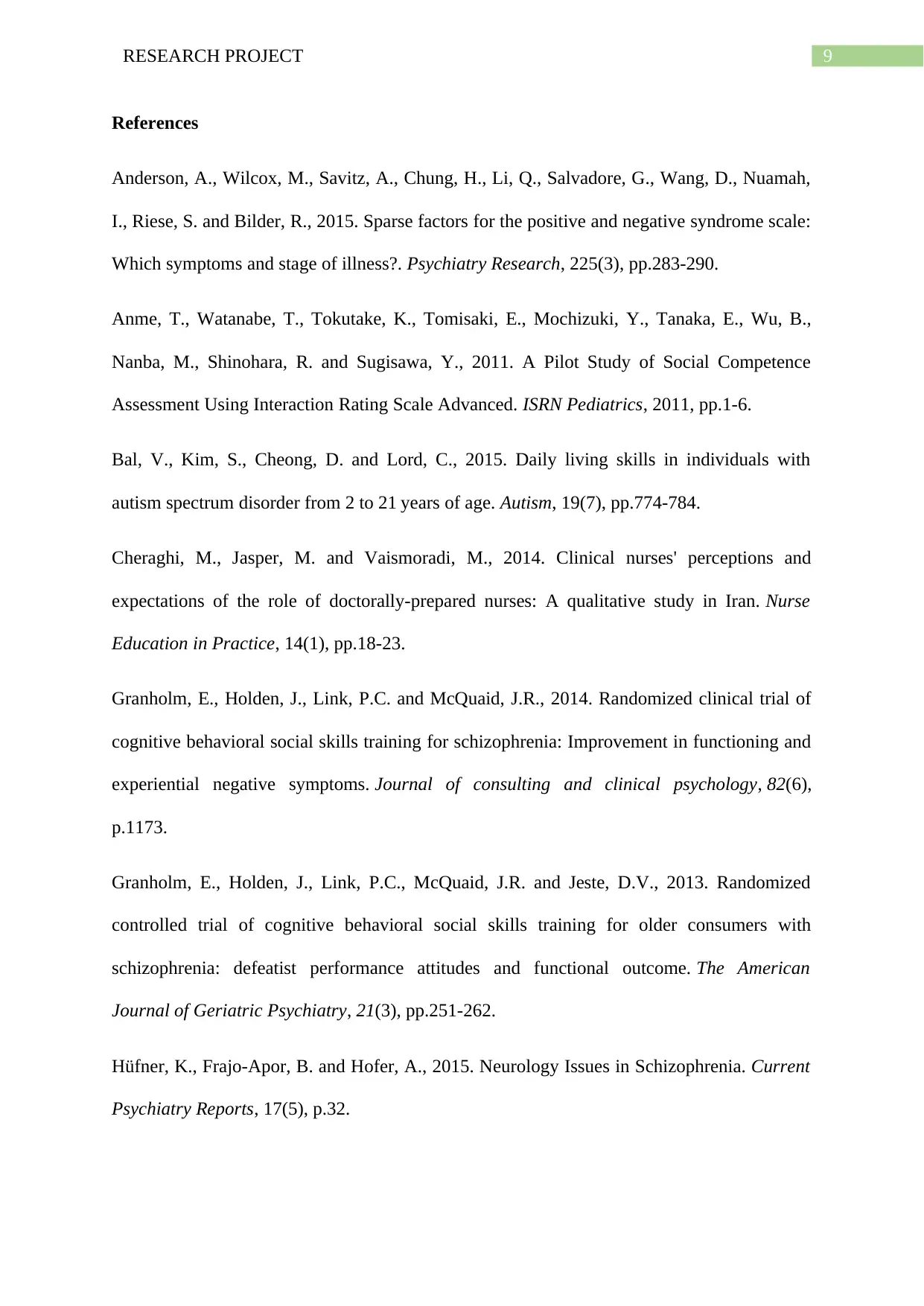
9RESEARCH PROJECT
References
Anderson, A., Wilcox, M., Savitz, A., Chung, H., Li, Q., Salvadore, G., Wang, D., Nuamah,
I., Riese, S. and Bilder, R., 2015. Sparse factors for the positive and negative syndrome scale:
Which symptoms and stage of illness?. Psychiatry Research, 225(3), pp.283-290.
Anme, T., Watanabe, T., Tokutake, K., Tomisaki, E., Mochizuki, Y., Tanaka, E., Wu, B.,
Nanba, M., Shinohara, R. and Sugisawa, Y., 2011. A Pilot Study of Social Competence
Assessment Using Interaction Rating Scale Advanced. ISRN Pediatrics, 2011, pp.1-6.
Bal, V., Kim, S., Cheong, D. and Lord, C., 2015. Daily living skills in individuals with
autism spectrum disorder from 2 to 21 years of age. Autism, 19(7), pp.774-784.
Cheraghi, M., Jasper, M. and Vaismoradi, M., 2014. Clinical nurses' perceptions and
expectations of the role of doctorally-prepared nurses: A qualitative study in Iran. Nurse
Education in Practice, 14(1), pp.18-23.
Granholm, E., Holden, J., Link, P.C. and McQuaid, J.R., 2014. Randomized clinical trial of
cognitive behavioral social skills training for schizophrenia: Improvement in functioning and
experiential negative symptoms. Journal of consulting and clinical psychology, 82(6),
p.1173.
Granholm, E., Holden, J., Link, P.C., McQuaid, J.R. and Jeste, D.V., 2013. Randomized
controlled trial of cognitive behavioral social skills training for older consumers with
schizophrenia: defeatist performance attitudes and functional outcome. The American
Journal of Geriatric Psychiatry, 21(3), pp.251-262.
Hüfner, K., Frajo-Apor, B. and Hofer, A., 2015. Neurology Issues in Schizophrenia. Current
Psychiatry Reports, 17(5), p.32.
References
Anderson, A., Wilcox, M., Savitz, A., Chung, H., Li, Q., Salvadore, G., Wang, D., Nuamah,
I., Riese, S. and Bilder, R., 2015. Sparse factors for the positive and negative syndrome scale:
Which symptoms and stage of illness?. Psychiatry Research, 225(3), pp.283-290.
Anme, T., Watanabe, T., Tokutake, K., Tomisaki, E., Mochizuki, Y., Tanaka, E., Wu, B.,
Nanba, M., Shinohara, R. and Sugisawa, Y., 2011. A Pilot Study of Social Competence
Assessment Using Interaction Rating Scale Advanced. ISRN Pediatrics, 2011, pp.1-6.
Bal, V., Kim, S., Cheong, D. and Lord, C., 2015. Daily living skills in individuals with
autism spectrum disorder from 2 to 21 years of age. Autism, 19(7), pp.774-784.
Cheraghi, M., Jasper, M. and Vaismoradi, M., 2014. Clinical nurses' perceptions and
expectations of the role of doctorally-prepared nurses: A qualitative study in Iran. Nurse
Education in Practice, 14(1), pp.18-23.
Granholm, E., Holden, J., Link, P.C. and McQuaid, J.R., 2014. Randomized clinical trial of
cognitive behavioral social skills training for schizophrenia: Improvement in functioning and
experiential negative symptoms. Journal of consulting and clinical psychology, 82(6),
p.1173.
Granholm, E., Holden, J., Link, P.C., McQuaid, J.R. and Jeste, D.V., 2013. Randomized
controlled trial of cognitive behavioral social skills training for older consumers with
schizophrenia: defeatist performance attitudes and functional outcome. The American
Journal of Geriatric Psychiatry, 21(3), pp.251-262.
Hüfner, K., Frajo-Apor, B. and Hofer, A., 2015. Neurology Issues in Schizophrenia. Current
Psychiatry Reports, 17(5), p.32.
Paraphrase This Document
Need a fresh take? Get an instant paraphrase of this document with our AI Paraphraser
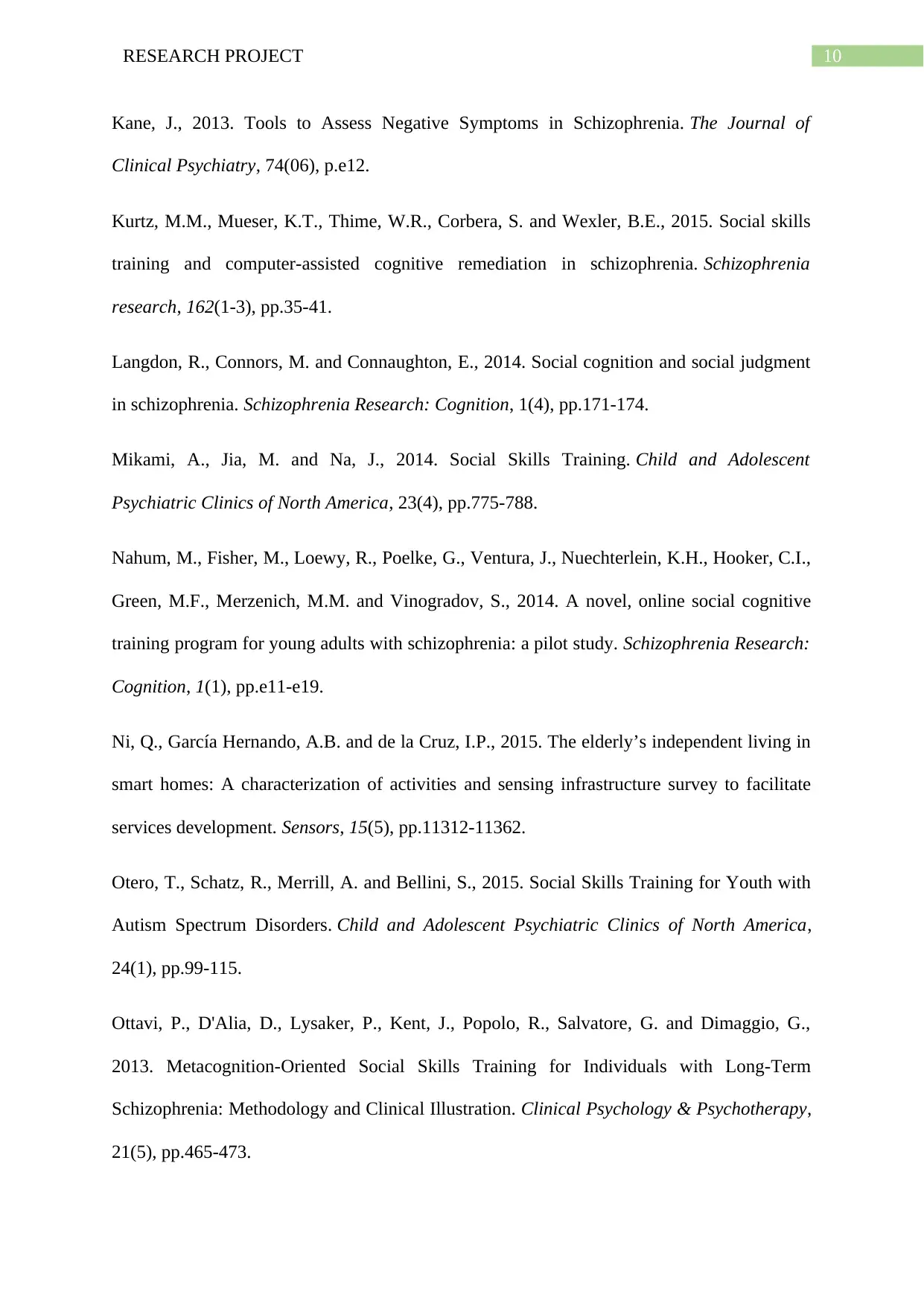
10RESEARCH PROJECT
Kane, J., 2013. Tools to Assess Negative Symptoms in Schizophrenia. The Journal of
Clinical Psychiatry, 74(06), p.e12.
Kurtz, M.M., Mueser, K.T., Thime, W.R., Corbera, S. and Wexler, B.E., 2015. Social skills
training and computer-assisted cognitive remediation in schizophrenia. Schizophrenia
research, 162(1-3), pp.35-41.
Langdon, R., Connors, M. and Connaughton, E., 2014. Social cognition and social judgment
in schizophrenia. Schizophrenia Research: Cognition, 1(4), pp.171-174.
Mikami, A., Jia, M. and Na, J., 2014. Social Skills Training. Child and Adolescent
Psychiatric Clinics of North America, 23(4), pp.775-788.
Nahum, M., Fisher, M., Loewy, R., Poelke, G., Ventura, J., Nuechterlein, K.H., Hooker, C.I.,
Green, M.F., Merzenich, M.M. and Vinogradov, S., 2014. A novel, online social cognitive
training program for young adults with schizophrenia: a pilot study. Schizophrenia Research:
Cognition, 1(1), pp.e11-e19.
Ni, Q., García Hernando, A.B. and de la Cruz, I.P., 2015. The elderly’s independent living in
smart homes: A characterization of activities and sensing infrastructure survey to facilitate
services development. Sensors, 15(5), pp.11312-11362.
Otero, T., Schatz, R., Merrill, A. and Bellini, S., 2015. Social Skills Training for Youth with
Autism Spectrum Disorders. Child and Adolescent Psychiatric Clinics of North America,
24(1), pp.99-115.
Ottavi, P., D'Alia, D., Lysaker, P., Kent, J., Popolo, R., Salvatore, G. and Dimaggio, G.,
2013. Metacognition-Oriented Social Skills Training for Individuals with Long-Term
Schizophrenia: Methodology and Clinical Illustration. Clinical Psychology & Psychotherapy,
21(5), pp.465-473.
Kane, J., 2013. Tools to Assess Negative Symptoms in Schizophrenia. The Journal of
Clinical Psychiatry, 74(06), p.e12.
Kurtz, M.M., Mueser, K.T., Thime, W.R., Corbera, S. and Wexler, B.E., 2015. Social skills
training and computer-assisted cognitive remediation in schizophrenia. Schizophrenia
research, 162(1-3), pp.35-41.
Langdon, R., Connors, M. and Connaughton, E., 2014. Social cognition and social judgment
in schizophrenia. Schizophrenia Research: Cognition, 1(4), pp.171-174.
Mikami, A., Jia, M. and Na, J., 2014. Social Skills Training. Child and Adolescent
Psychiatric Clinics of North America, 23(4), pp.775-788.
Nahum, M., Fisher, M., Loewy, R., Poelke, G., Ventura, J., Nuechterlein, K.H., Hooker, C.I.,
Green, M.F., Merzenich, M.M. and Vinogradov, S., 2014. A novel, online social cognitive
training program for young adults with schizophrenia: a pilot study. Schizophrenia Research:
Cognition, 1(1), pp.e11-e19.
Ni, Q., García Hernando, A.B. and de la Cruz, I.P., 2015. The elderly’s independent living in
smart homes: A characterization of activities and sensing infrastructure survey to facilitate
services development. Sensors, 15(5), pp.11312-11362.
Otero, T., Schatz, R., Merrill, A. and Bellini, S., 2015. Social Skills Training for Youth with
Autism Spectrum Disorders. Child and Adolescent Psychiatric Clinics of North America,
24(1), pp.99-115.
Ottavi, P., D'Alia, D., Lysaker, P., Kent, J., Popolo, R., Salvatore, G. and Dimaggio, G.,
2013. Metacognition-Oriented Social Skills Training for Individuals with Long-Term
Schizophrenia: Methodology and Clinical Illustration. Clinical Psychology & Psychotherapy,
21(5), pp.465-473.
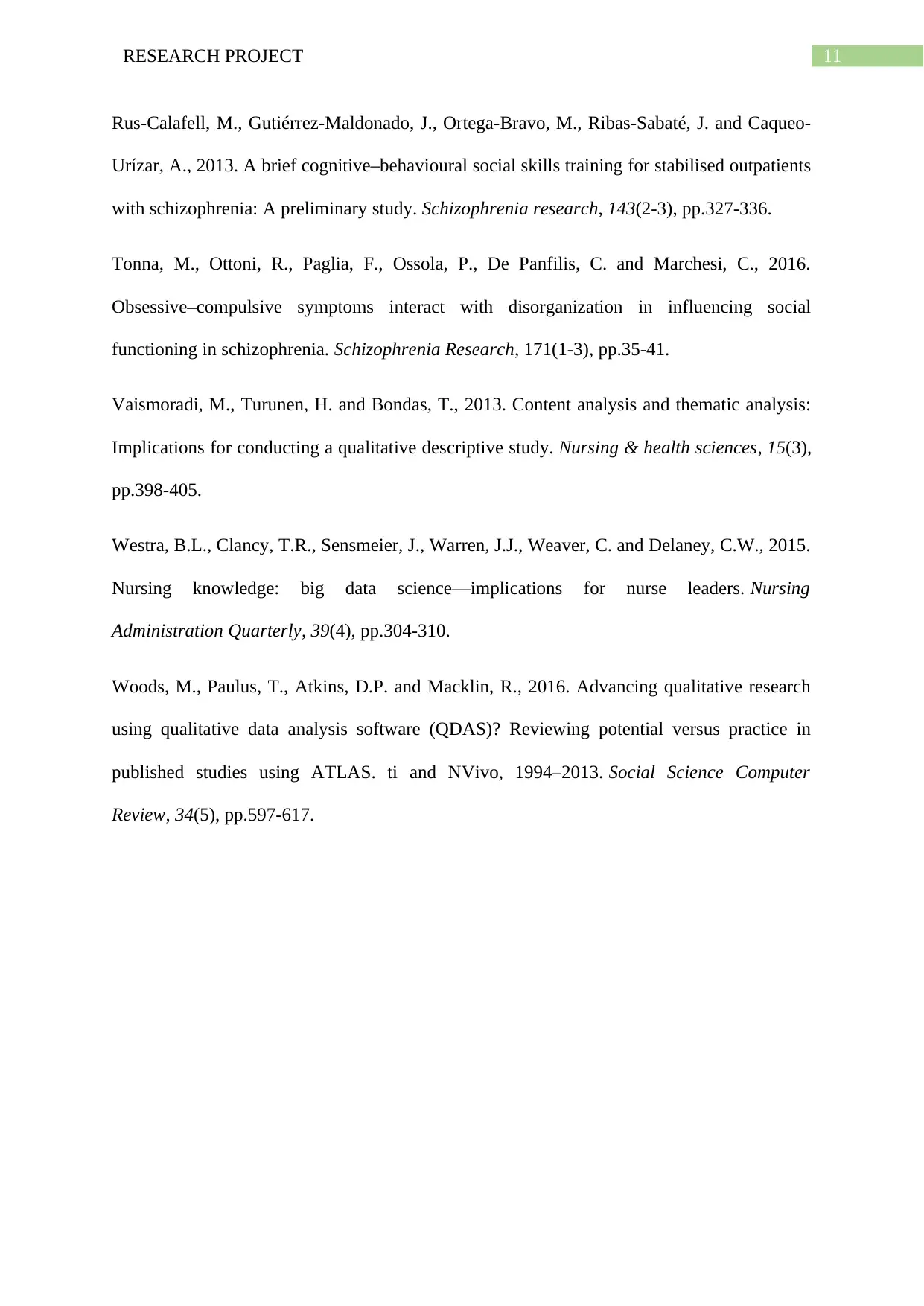
11RESEARCH PROJECT
Rus-Calafell, M., Gutiérrez-Maldonado, J., Ortega-Bravo, M., Ribas-Sabaté, J. and Caqueo-
Urízar, A., 2013. A brief cognitive–behavioural social skills training for stabilised outpatients
with schizophrenia: A preliminary study. Schizophrenia research, 143(2-3), pp.327-336.
Tonna, M., Ottoni, R., Paglia, F., Ossola, P., De Panfilis, C. and Marchesi, C., 2016.
Obsessive–compulsive symptoms interact with disorganization in influencing social
functioning in schizophrenia. Schizophrenia Research, 171(1-3), pp.35-41.
Vaismoradi, M., Turunen, H. and Bondas, T., 2013. Content analysis and thematic analysis:
Implications for conducting a qualitative descriptive study. Nursing & health sciences, 15(3),
pp.398-405.
Westra, B.L., Clancy, T.R., Sensmeier, J., Warren, J.J., Weaver, C. and Delaney, C.W., 2015.
Nursing knowledge: big data science—implications for nurse leaders. Nursing
Administration Quarterly, 39(4), pp.304-310.
Woods, M., Paulus, T., Atkins, D.P. and Macklin, R., 2016. Advancing qualitative research
using qualitative data analysis software (QDAS)? Reviewing potential versus practice in
published studies using ATLAS. ti and NVivo, 1994–2013. Social Science Computer
Review, 34(5), pp.597-617.
Rus-Calafell, M., Gutiérrez-Maldonado, J., Ortega-Bravo, M., Ribas-Sabaté, J. and Caqueo-
Urízar, A., 2013. A brief cognitive–behavioural social skills training for stabilised outpatients
with schizophrenia: A preliminary study. Schizophrenia research, 143(2-3), pp.327-336.
Tonna, M., Ottoni, R., Paglia, F., Ossola, P., De Panfilis, C. and Marchesi, C., 2016.
Obsessive–compulsive symptoms interact with disorganization in influencing social
functioning in schizophrenia. Schizophrenia Research, 171(1-3), pp.35-41.
Vaismoradi, M., Turunen, H. and Bondas, T., 2013. Content analysis and thematic analysis:
Implications for conducting a qualitative descriptive study. Nursing & health sciences, 15(3),
pp.398-405.
Westra, B.L., Clancy, T.R., Sensmeier, J., Warren, J.J., Weaver, C. and Delaney, C.W., 2015.
Nursing knowledge: big data science—implications for nurse leaders. Nursing
Administration Quarterly, 39(4), pp.304-310.
Woods, M., Paulus, T., Atkins, D.P. and Macklin, R., 2016. Advancing qualitative research
using qualitative data analysis software (QDAS)? Reviewing potential versus practice in
published studies using ATLAS. ti and NVivo, 1994–2013. Social Science Computer
Review, 34(5), pp.597-617.
⊘ This is a preview!⊘
Do you want full access?
Subscribe today to unlock all pages.

Trusted by 1+ million students worldwide
1 out of 12
Related Documents
Your All-in-One AI-Powered Toolkit for Academic Success.
+13062052269
info@desklib.com
Available 24*7 on WhatsApp / Email
![[object Object]](/_next/static/media/star-bottom.7253800d.svg)
Unlock your academic potential
Copyright © 2020–2026 A2Z Services. All Rights Reserved. Developed and managed by ZUCOL.





